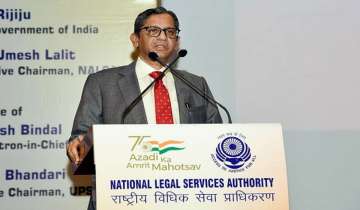Passing legislature laws without assessing their impact leads to 'big issues': CJI Ramana
CJI also said that the people also need to know the scope and limitations of the roles ascribed to the different organs of the state.

Chief Justice of India NV Ramana on Saturday expressed concern on the issue of the legislature not conducting studies to assess the impact of the laws before getting them passed, which, he said sometimes leads to "big issues".
"Another issue is that the legislature does not conduct studies or assess the impact of the laws that it passes. This sometimes leads to big issues. The introduction of Section 138 of the Negotiable Instruments Act is an example of this. Now, the already burdened magistrates are further burdened by thousands of these cases," said the CJI.
Speaking at the Valedictory Function of the Constitution Day Celebrations, CJI Ramana also said that people need to be aware of their rights and entitlements.
"If people are unaware about their rights and entitlements, they cannot claim benefit from the same," he added.
"We are tirelessly working to uphold the Constitution, but there is still a need to spread more understanding about the Constitution," the CJI further said.
He also said that the people also need to know the scope and limitations of the roles ascribed to the different organs of the state.
"We need to clear the prevailing misconceptions. ...many people in this country believe that it is the courts that make laws. Another set of misunderstandings relating to the belief that the courts are responsible for liberal acquittals and adjournments," he said.
"However, the truth is that the public prosecutors, advocates and parties - all have to co-operate with the judicial process. Non-cooperation, procedural lapses and faulty investigation cannot be blamed on Courts," Ramana added.
Reacting to Attorney General KK Venugopal's suggestion of setting up courts of appeal to overcome judicial pendency, restructuring of the judicial system and altering the hierarchy of the courts, CJI said pendency is multifaceted in nature and the suggestions of AG is something that merits consideration by the government.
Ramana said, "Since independence, I do not think there has been a serious study to consider what exactly should be the structural hierarchy of judiciary in India."
CJI opined that rebranding the existing courts as commercial courts, without creating a special infrastructure, will not have any impact on the pendency. CJI Ramana while appreciating President Ram Nath Kovind said that he has constantly encouraged the entry of women into the legal profession.
"He called for increased representation of women in the judiciary. His concern for the judiciary is also clear from the fact that he has been travelling all across the country and interacting with Judges of the High Courts, which is very encouraging," he said.
"The President's dedication to a vision of equality and justice will naturally trickle down to the conscience of the common man. His journey to being the President of India has been of immense hope to the people of this country," the CJI added.
Further, he reacted to Law Minister Kiren Rijiju's statement that the government has been allocating substantial amounts for the development of judicial infrastructure, and said that funds are not the problem, the problem is with some of the states not coming forward to match the grants.
"As a result, the central funds largely remain unutilised. That is the reason why I am proposing a special purpose vehicle of Judicial Infrastructure of Authority. I beseech the Minister to take this proposal to the logical conclusion. I also urge the Minister to expedite the process of filling judicial vacancies," the CJI added.
The Union Minister for Law and Justice Kiren Rijiju had said that the Union government has approved a sum of Rs 9,000 crores for the development of judicial infrastructure and that he has taken note of the suggestions made by the Chief Justice of India to give thrust to the development of judicial infrastructure.
Rijiju had further said that India can become a great country only if we create a balance between Fundamental Rights and Fundamental Duties.
"Although I don't want to create a debate between Fundamental Rights and Fundamental Duties, there was a need to evaluate how much we have progressed as a nation," he said.
The Law Minister further added that he comes from a very remote area of the country and could connect his village to the main road only after he became a Member of Parliament.
He said that he never knew the Fundamental Rights since he always grew up with the concept of Fundamental Duties.
"If you see a soldier standing on the remote border or somewhere in the isolated territory of the country, he (the soldier) would not think about his Fundamental Rights but he would always think about his Fundamental Duties," Rijiju said.
Delivering the welcome address at the Valedictory Function of the Constitution Day 2021 celebrations, Justice AM Khanwilkar said that Indians have travelled to Mars since independence, but our legal system remains the same.
"We had little exposure to the metaphysical concept in our ancient systems. Since independence, we have travelled to Mars but our legal system remains the same. We need to target clogging of dockets and tattered justice delivery system," Justice Khanwilkar said.
(With ANi inputs)
ALSO READ | Modern education lacks 'spiritual' function, unequipped to build students' character: CJI